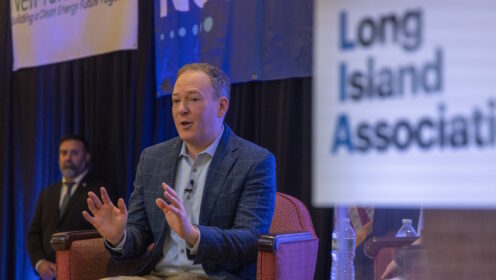by Susan Crabtree
EPA chief Lee Zeldin vows urgent action to stop toxic sewage from Mexico fouling SoCal beaches, as Navy SEALs fall ill and locals demand an end to decades of pollution.

SAN DIEGO — Environmental Protection Agency Administrator Lee
Zeldin’s trip Tuesday to this scenic, family-friendly coastal tourist
destination was all business and at times quite unpleasant, considering
the noxious fumes he was there to discuss.
Zeldin visited this border city on Earth Day to try to put an end to a
decades-long environmental catastrophe: Billions of gallons of sewage
and industrial chemicals from Mexico have flowed into the Pacific Ocean
in Southern California, closing local beaches and sickening U.S. Navy
SEALs who train in the water on nearby beaches.
The cross-border pollution has been going on for decades with
Congress addressing the disgusting effluence piece-meal, throwing more
than $653 million at the problem over the last five years alone even as
the contaminant levels surged.
The Tijuana River runs close to the coast in Mexico, then flows into
California, through Navy-owned land, and dumps into the ocean. In recent
years, Tijuana’s population and industry have boomed, overwhelming its
aging wastewater treatment plants and pumping stations and increasing
the levels of toxins, including industrial chemicals, bacteria, and
trash, in the river and nearby coastal waters. Scientists and
researchers say the sewage not only contaminates the water, but it also
vaporizes into the air, and they have detected high levels of harmful
gases in the area.
Enter President Trump, who, with his “drill-baby-drill” refrain, may
seem an unlikely environmental hero. But the president has been
intensely focused on the border and has demanded that Mexico help stop
the flow of illegal immigrants, drugs, and now human waste into U.S.
territory and waters. During Trump’s first term, he usually either
touted progress on his “big, beautiful border wall” or railed against
Democrats’ efforts to defund it, without mentioning the sewage pouring
into California coastal zones.
Now the problem is “top of mind” for Trump, Zeldin said.
Zeldin, a former Congressman from New York who ran an unsuccessful
campaign for governor in 2022, spent his day discussing various options
to expedite solutions. He met the previous evening with his Mexican
environmental counterparts and left the meeting hopeful about their
commitment, but he also didn’t mince words.
“I’m a New Yorker, and if I say this in a way that offends people
from Southern California, I’m sorry. But I know my counterparts in
Mexico are listening,” Zeldin told reporters after a forum with a
bipartisan group of congressmen and local leaders. “What’s going on
inside of the American who just cares about having it resolved – they
don’t give a shit about how it gets done, as long as this crisis is
over.”
Earlier in the day, while touring a U.S. plant that treats sewage as a
secondary facility to one in Mexico, Darrell Issa, longtime San
Diego-area GOP congressman, recounted an alarming story. He recalled one
Border Patrol agent telling him the Tijuana River water is so toxic
that his boots started disintegrating after stepping into it while doing
his job.
Rep. Mike Levin, a Democrat representing northern San Diego County,
later told reporters that his wife’s nephew, who had trained as a SEAL
near the border, had been diagnosed with cancer in his 20s. The family
can’t prove that his training in the deeply polluted water caused the
cancer, but they have their suspicions. Other Navy vets have recently
started dubbing the sewage outflows, located roughly one mile from their
training waters, the “next Camp Lejeune.”
The Navy is considering relocating its Coronado training site for
SEAL candidates after documenting 1,168 cases of acute gastrointestinal
illnesses among its recruits from 2019 to 2023. The pollution has
sickened swimmers, surfers, lifeguards, and border patrol agents,
closing California beaches near the border more often than they’ve been
open over the last four years.
Zeldin, who took a helicopter tour of the polluted areas and met with
Navy officials Tuesday, said American patience has run out. In the
coming days, he will deliver to Mexico a to-do list to resolve the
environmental crisis and plans to issue a joint statement outlining
concrete steps, which must happen “as fast as humanly possible.”
The actions must be “aggressively pursued with extreme urgency,” he stated.
During the tour of the U.S. wastewater treatment center, lawmakers
and local officials explained that expanding that facility alone will
only take care of roughly half the problem. The center can treat only a
limited amount of raw sewage before releasing it directly into the
ocean. Meanwhile, Mexican factories and people are dumping chemicals and
trash into the Tijuana River itself.
The Mexican government, Zeldin said, must clean up the river and
prevent its citizens from re-contaminating it. In 2022, Mexico committed
$88 million to help remediate the pollution but still needs to
designate the funds to several ongoing wastewater treatment projects and
upgrades. One of those projects must be installing floodgates to
collect trash in Tijuana, Zeldin said.
“They cannot view this as a U.S. problem just because their
contamination reached U.S. soil,” he said. “We need Mexico to not just
commit to all the projects that will stop the flow, but in order to
actually finish this project, they’re going to [have to] commit to that
final cleanup.”
The meetings on the issue so far have been productive, Zeldin
stressed, noting that the relatively new administration of Mexican
President Claudia Sheinbaum has appeared receptive to working out a
“strong collaborative relationship” and a course of action.
Zeldin, however, did not outline any enforcement actions and said he
has not discussed the possibility of making Mexico’s action on the
sewage problem a condition to a pending agreement to lift tariffs.
“I haven’t had that conversation with anyone – that’s not something
that I’ve heard,” he told RealClearPolitics. “But I wouldn’t read into
that one way or the other.”
San Diego County Supervisor Jim Desmond, a Republican challenging
Levin for his congressional seat, has been the one sounding the alarm
since the first days of the Trump administration. During Tuesday’s
meeting with Zeldin and other lawmakers, Desmond suggested a far simpler
solution than the complex set of wastewater upgrades and expansions on
both sides of the border under consideration.
“I’m happy to support the plant there, but – I’ll go out on a limb – I
think we need to dam up the Tijuana River,” he said in the meeting, a
video of which a reporter posted on X.com afterward. “That’s what
everything’s being thrown into – mattresses, shopping carts, tires,
diapers – everything that’s coming across the border.”
Desmond also expressed optimism that “real, tangible solutions” are
on the way, but said he plans to continue keeping the pressure on
Mexico.
“I’m not letting up until we see results,” he said after the meeting.
“Holding Mexico accountable is no longer optional – it’s urgent. Our
beaches, our health, and our military demand it.”
Zeldin didn’t comment on Desmond’s proposal to dam the river, which
would no doubt anger environmentalists who have complained for decades
that the pollutants are harming the entire Tijuana Valley estuary,
leading to mass deaths of its fish and other marine life and a reduction
in biodiversity.
Doing so would also violate numerous environmental regulations. The
estuary is one of just 30 that remain protected in North America and is
recognized by the United Nations as coastal wetlands in need of these
safeguards. Even so, Mexican factories and others continue to violate
the protections and disregard regulations.
The bilateral solution will likely be complex, Zeldin said, but the
status quo is unacceptable. The administrator then predicted that the
U.S. and Mexican government would be celebrating putting the crisis in
the “rearview mirror” by Earth Day 2026.
“There’s no way that we are going to stand before the people of
California and ask them to have more patience and just bear with all of
us as we go through the next 10 or 20 or 30 years of being stuck in 12
feet of raw sewage and not getting anywhere,” he pledged.
As to why Trump is making the issue a priority now and why no other
president, Democrat or Republican, over the last 25 years has
successfully tackled it, Zeldin demurred.
“Look, I have plenty of thoughts as to missed opportunities in the
past,” he told RCP. “But I’m not here to look backwards right now. I’m
just looking forward.”
***
This article was originally published by RealClearPolitics and made available via RealClearWire.
Susan Crabtree is RealClearPolitics' White House/national political correspondent.
Source: https://www.frontpagemag.com/fpm-plus/the-doge-war/
Follow Middle East and Terrorism on Twitter











